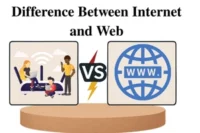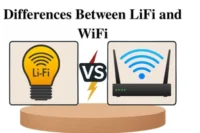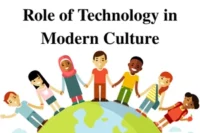Ultimate Guide to Basic and Advance Technology Skills for Students to Succeed
Published: 28 Aug 2025
In today’s world, technology is found everywhere! From cell phones to laptops, we rely on technology every day to learn, work, and stay connected. As a result, children must possess excellent technical skills. These skills enable learners to achieve academic success, comprehend their surroundings, and prepare for future careers.
However, not all students have equal access to technology or the necessary skills to use it effectively. Research indicates that many students continue to struggle with fundamental digital skills.
So, what can students do to improve their technology skills? These skills are essential for tasks such as completing schoolwork, conducting research, and communicating with friends. As students progress, they can acquire more complex skills, such as coding and data analysis, to better prepare for future employment.
Let’s dive into the top technology skills every student needs to succeed!
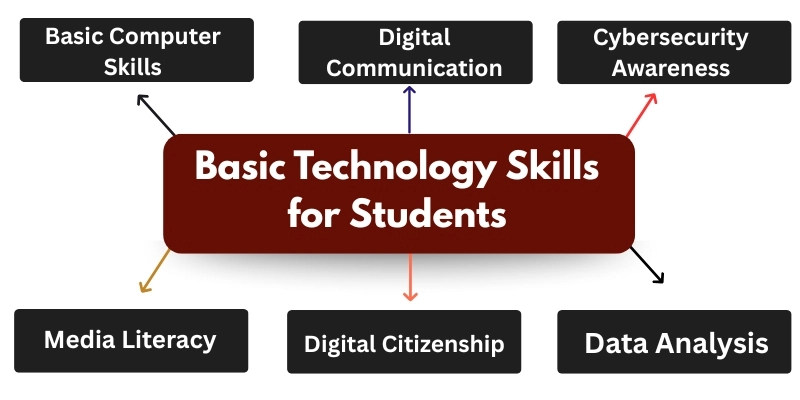
Basic Technology Skills Every Student Should Master
As children grow, it becomes increasingly essential for them to develop a range of technological skills. These fundamental technology skills not only help students excel in their education but also equip them to communicate effectively and prepare for the future. Mastering these essential technology skills will empower students to succeed both in school and beyond.
Here are the key technological abilities every student should strive to master.
1. Basic Computer Skills
Every student must be familiar with fundamental computer skills, which serve as the foundation for using technology in school and later in life. These skills include:
- Operating Systems: Learn how to use common operating systems such as Windows or macOS. Knowing how to use these systems like computers and laptops helps with school assignments and everyday tasks.
- File Management: Students should understand how to create, save, and manage files. This strategy helps keep their work organized and easy to find.
- Typing Proficiency: The ability to type quickly and properly is essential for composing essays, reports, and emails. Practice typing to become quicker and more efficient.
2. Digital Communication
Digital communication has replaced traditional forms of social and professional interaction. Students must be proficient in a variety of digital communication technologies to effectively collaborate, study online, and stay connected with instructors and classmates.
- Use Email: Learn to send and respond to emails. It is also crucial to stick to email protocol, including using polite language and maintaining a professional layout.
- Video Conferencing: Students often need to join online classes or meetings. Knowing how to use video conferencing tools like Zoom or Google Meet is important.
- Collaborative Tools: Platforms like Google Docs or Microsoft Teams allow students to work together on projects. Being able to use these tools helps students collaborate easily and efficiently.
3. Cybersecurity Awareness
As students spend more time online, cybersecurity has become one of the most important skills to learn. Understanding how to keep safe online is equally crucial as understanding how to utilize digital technologies effectively.
- Recognize Phishing Attempts: Hacking is when someone tries to scam you into disclosing personal information. Students should be able to identify suspicious emails and websites.
- Manage Passwords: Students should create strong, unique passwords and keep them safe. Using a Google password manager can also help them save.
- Browse Safely: Learn how to use the internet safely, avoid harmful websites, and protect personal information from cybercriminals.
4. Media Literacy
In the modern era of digital technology, students are continuously interacting with internet content. Understanding and analyzing media are crucial abilities.
- Evaluate Online Information: Not everything on the internet is authentic. Students should learn how to determine the trustworthiness of information by examining the source and verifying the facts.
- Understand Digital Footprints: Every online action leaves a digital impression. Students should be aware that what they post or search for can be seen by others.
- Create Ethical Content: When students create online content, they should respect the work of others. This includes understanding copyright and always giving credit to the original creators.
5. Digital Citizenship
Being a responsible digital citizen is about using technology safely, respectfully, and ethically. Students must understand their rights and responsibilities when interacting online on different social platforms.
- Act Respectfully Online: Treat others with kindness, just like they would in person. Avoid cyberbullying and practice good online communication etiquette.
- Understand Digital Rights and Responsibilities: Know what is legal and ethical when using the internet, including respecting privacy and avoiding the spread of harmful content.
6. Research and Data Analysis
In the digital era, being able to find, analyze, and comprehend data is critical for academic achievement. Students should learn to:
- Effective Internet Searching: Knowing how to use search engines like Google to find what they need is a key skill.
- Data Interpretation: Students should be able to understand and analyze data, such as graphs and charts, to make knowledgeable decisions.
- Critical Thinking: When students come across information online, they should ask: “Is this reliable? Can I trust it?”
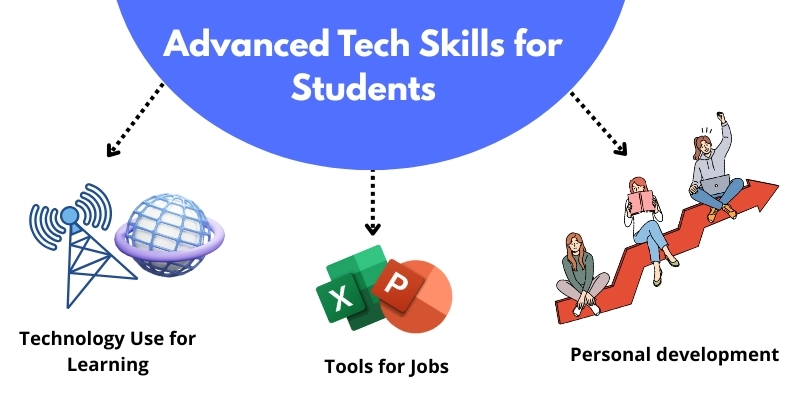
Advanced Tech Skills for Students Future Careers
As technology continues to shape the world, students need to acquire advanced skills that will enable them to succeed in their future careers. The role of technology skills in student success is not only about using technology; it is also about creating, analyzing, and solving problems in new ways.
Here are some of the advanced technology skills for students to master for their bright future:
1. Coding and Programming
Coding and programming are processes that instruct computers on what to do. By learning programming languages, students can create software, apps, games, and even websites. Some popular programming languages include:
- Python: Often used for data analysis and artificial intelligence.
- JavaScript: Helps build websites and make them interactive.
- Java: Commonly used in creating mobile apps.
Why is Coding Important?
Many jobs in technology demand coding skills. To design applications or websites, a software developer must be proficient in coding. Students can start by learning basic coding with free online resources such as Code.org or Scratch.
2. Digital Design and Multimedia
Digital design involves creating graphics, videos, and other forms of multimedia content using digital tools and software. Students can utilize software such as Adobe Photoshop, Illustrator, and Premiere Pro to create designs, animations, and video editing.
Why is Digital Design Important?
Digital design is essential in many industries. If a student is interested in marketing, they will use graphic design to create ads and social media posts. Video editing skills are crucial for filmmakers and YouTubers seeking to create high-quality content.
Canva is mainly used for creating social media post designs.
3. Data Science and Analytics
Data science is the process of collecting and analyzing large datasets to identify patterns and trends. By utilizing tools such as Excel, Google Analytics, and Python, students can effectively analyze data to make critical decisions.
For example, data scientists support companies in gaining a better understanding of client behavior, enabling them to improve their products and services.
Why is Data Science Important?
Companies nowadays make decisions based on data in practically every industry. For example, a company may utilize data analytics to determine which items to offer or how to enhance customer service. Learning data science can help students prepare for employment in various fields, including technology, healthcare, and marketing.
4. Artificial Intelligence and Machine Learning
Artificial Intelligence (AI) is the ability of computers to think and learn like humans. Machine Learning (ML) is a type of artificial intelligence that enables computers to learn from data and improve their performance over time without being explicitly programmed.
These Essential technologies for students in 2025 are used in many everyday things, like voice assistants (e.g., Siri or Alexa), recommendation systems (e.g., Netflix), and even self-driving cars.
Why is AI and ML Important?
AI and machine learning are revolutionizing industries including healthcare, transportation, and entertainment. Understanding how these technologies operate provides students with a competitive advantage in disciplines such as robotics, data analysis, and software development.
The Importance of Technology Skills for Students
In today’s fast-paced world, technology skills are key to student success. Whether it’s for schoolwork or future jobs, knowing how to use technology well can make a big difference.
Let’s examine how these basic technological skills benefit students in three key areas.
1. Better Academic Performance
Technology plays a significant role in learning today. Students use computers to research, write papers, and solve problems.
Students who lack technological skills may struggle to complete homework, take online exams, or participate in online classes. A kid who is comfortable with computers will perform better in school than one who is unfamiliar with this technology.
For Example: If a student is studying science, they may search the internet for videos or articles that clarify complicated concepts. Being able to access and use trusted web resources rapidly may make learning significantly simpler.
2. Using Tools for Future Careers
Nowadays, almost all jobs need some amount of technological expertise. Computers, software, and the Internet are used in nearly every industry, including healthcare and business.
Knowing how to utilize tools like Microsoft Word, Excel, and even coding programs might lead to new opportunities in professional life.
3. Personal Growth and Development
The growing demand for technology skills also helps students grow as individuals.
Being technically an expert also increases confidence. When students can handle minor technological issues independently, such as troubleshooting a computer or creating a presentation, they feel more competent and self-sufficient.
For example, understanding how to use the internet securely educates children about digital responsibility and accountability. They can understand how they can protect their online privacy and prevent threats like email fraud and online harassment.
Strategies for Developing Technology Skills for Students
Developing technological skills is crucial, and it shouldn’t necessarily be restricted to computer lessons. Students can improve their technology skills in various ways.
Here are some basic techniques to help students improve their technological skills both inside and outside of school.
1. Extracurricular Activities
Extracurricular activities are activities that occur outside of regular school hours. These can include clubs, workshops, and online courses that help students learn new technology skills.
For example, coding clubs, robotics workshops, and digital art classes can provide students with an opportunity to explore technology in a fun and supportive environment.
Why are Learning these Skills Important?
Extracurricular activities offer students additional practice and learning opportunities beyond the classroom. These activities are often practical, allowing students to work on projects that motivate them.
Furthermore, these activities promote cooperation, problem-solving skills, and creativity.
2. Parental and Community Involvement
Parents and community members can play a significant role in helping students develop technology skills. Parents can encourage their children to use technology in positive ways and demonstrate to them how to utilize educational apps.
Communities can provide programs and activities that educate technological skills, such as weekend coding camps or tech workshops.
Why is it Important?
When parents and the community become involved, students feel more supported and driven. Students are more likely to succeed when they get support from others around them. Parental participation ensures that students use technology appropriately and securely.
Overcoming Challenges in Education Technology
While learning technology is essential, it also presents specific issues for students and institutions. These problems include limited access to technology, the digital divide, and opposition to change.
Let’s examine these challenges and consider some basic solutions to help pupils overcome them.
1. Access to Technology
The Issue:
Many students do not have access to computers or the internet at home. This might make it difficult for them to finish homework, take online classes, or master new technical skills.
Proposed Solutions:
- Lend Out Devices: Schools can provide students with laptops or tablets to use at home so they have the tools they need to complete their work.
- Free Internet Access: Some communities offer free or discounted internet service to families who need it. Schools can work with local businesses or government programs to provide internet access to all students.
2. The Digital Divide
The Issue:
The digital divide refers to the gap between people who have access to modern technology and those who do not. This divide can make it harder for some students to succeed in a technology-driven world.
Proposed Solutions:
- Provide Equal Resources: Schools can aim to ensure equal access to technology for all students. This involves providing students with adequate laptops, iPads, and internet connectivity.
- Community Partnerships: Schools can work with local companies and organizations to give technology tools to underprivileged families.
Conclusion
Technology skills are essential for students today. They help students succeed in school, prepare for future careers, and use digital tools safely and responsibly. From basic computer skills to advanced topics such as coding and artificial intelligence, these skills are essential to success in the modern world.
Schools should teach technology skills, and children should welcome the opportunity to study and explore them. Policymakers may help by ensuring that all children, regardless of background, have access to the right tools and resources.
Questions about Learning Tech Skills for Students
Here are some FAQs about the 21st century technology skills for students.
Technology skills are essential because they encourage students to succeed in school, prepare for future careers, and utilize technology safely and responsibly. Learning technology allows students to complete assignments,
The primary technology skills students should learn include:
- Using a computer and operating systems (like Windows or macOS)
- Managing files and folders
- Typing efficiently
- Using the Internet to search for information
- Basic software tools like word processors (Microsoft Word, Google Docs) and spreadsheets (Excel, Google Sheets)
Yes, technology can help you develop fundamental skills such as problem-solving, critical thinking, and creativity. For example, students utilize technology to conduct research, evaluate data, and develop innovative solutions.
Learning to utilize digital tools helps students develop skills such as creating websites, movies, and applications, which improves their creative thinking.
A great way to start learning coding is by using online resources like:
- Scratch for beginners (creates simple games and animations)
- Code.org for interactive coding lessons.
- Codecademy for learning programming languages like Python or JavaScript
Cybersecurity education is important because it teaches students how to protect their personal information and utilize technology safely and securely.
Students must understand how to secure their devices, recognize online threats such as phishing attacks, and use strong passwords. Learning cybersecurity allows young minds to be safe and responsible online.

- Be Respectful
- Stay Relevant
- Stay Positive
- True Feedback
- Encourage Discussion
- Avoid Spamming
- No Fake News
- Don't Copy-Paste
- No Personal Attacks



- Be Respectful
- Stay Relevant
- Stay Positive
- True Feedback
- Encourage Discussion
- Avoid Spamming
- No Fake News
- Don't Copy-Paste
- No Personal Attacks


